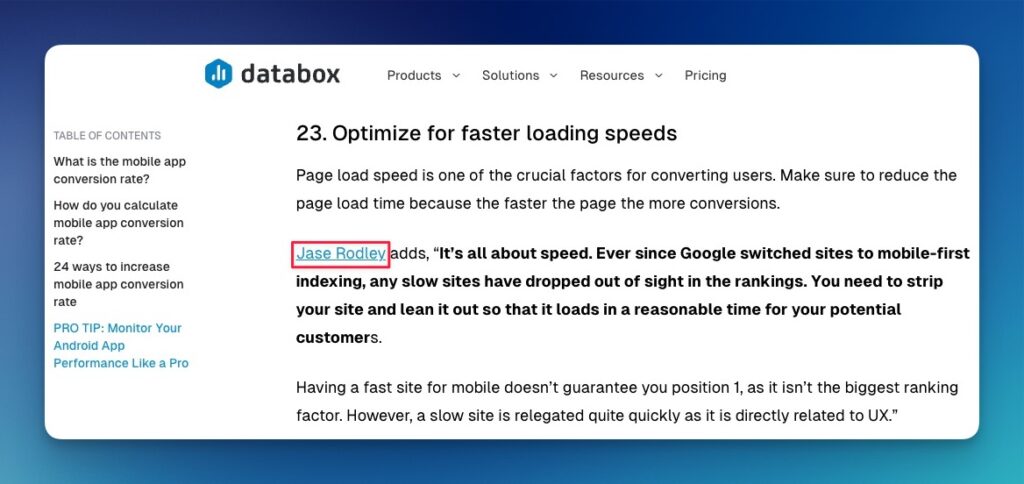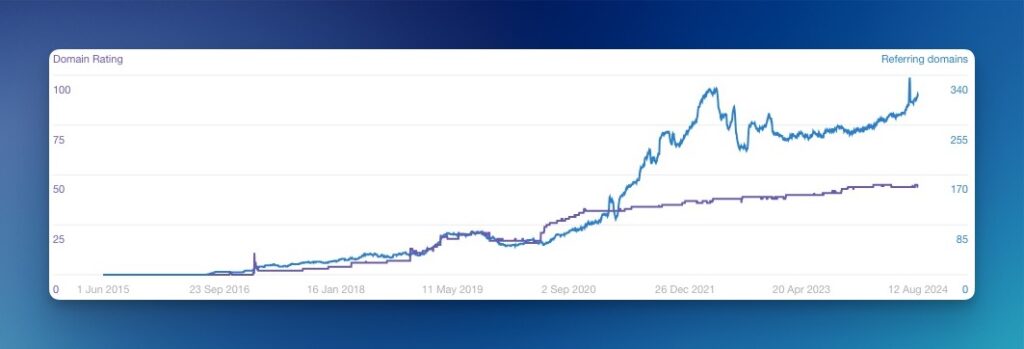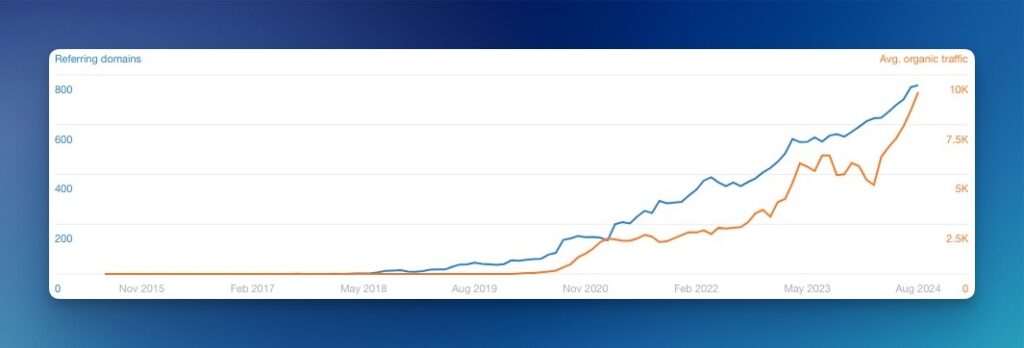If your PR efforts are failing to support what is otherwise a stellar digital strategy, partnering with a consultant can save you a lot of time.
An experienced professional like myself can refine your PR approach and leverage earned media to improve your business’s visibility.
Being seen and praised on reputable websites that you don’t own is one way to do that. It signals trust and authority, which is a giant green light for both your customers and the search engines that they use.
Without publicity and Google’s vote of confidence, you’re going to have to rely on paid advertising to stay visible online, which can get prohibitively expensive in the long run.
Owned media is a prerequisite for ranking in Google’s organic search results, but earned media is a whole different beast. Securing it through PR efforts is a proven way to revive underperforming websites. Think of it as digital word of mouth.
I’ve experimented with all sorts of PR strategies in an effort to improve organic search performance, and through a lot of experimentation, I’ve come to learn that one size does not fit all.
If you need help with identifying the right strategies for your brand and need support in executing them effectively, I might be the right person to help.
A Win-Win Situation
Marketing budgets are rarely over funded, so you need to make every cent count. Few things are sweeter than a digital strategy that achieves two goals at once. Like digital PR and SEO.
The two are closely linked because they focus on building online visibility and credibility, causing their strategies to overlap.
Digital PR involves securing coverage, mentions, and backlinks from reputable websites and media outlets. The very nature of this work boosts your brand’s authority in search engines and builds a great deal of trust with your customers.

Backlinks play a key role in SEO, as they signal to search engines that your website is a reliable source of information, which can improve search rankings.
This dual approach helps you stay ranked and ensures your marketing efforts have room to grow and compound over time.
However, this doesn’t mean it’s a once and done strategy. Like anything digital, change is constant. A consultant can really help to keep you or your team informed, and on the right path to keep winning.
Reasons to Leverage Digital PR
Getting your website noticed and your brand talked about can be tough, especially if you operate in a competitive niche with little visibility.
That’s where digital PR helps. It’s essentially a marketing strategy that shapes the online image of your company.
If you’re from a Fortune 500 company, thinking about the brand you represent is easy. Your company’s brand is likely a household name, or there may even be many brands owned by your company.
But if you’re from a smaller business, it may not be as obvious. In fact, the leap from struggling small business to well-established, sustainable business often lies in whether the owner has developed and invested in building a brand.

While many traditional business functions were quick to go digital, PR took its time to catch up. It only became mainstream after Google’s Penguin update in 2012, when earned media and legitimate backlinks became a key requirement for ranking in organic search.
The use of digital PR has grown tremendously in the last few years and is now seen as a pivotal marketing strategy in its own right. It involves applying the principles of traditional PR to digital assets, brands, and products. Even people—as personal brands become more important.
It’s an excellent way to build rapport with journalists and get your brand mentioned in well-known online publications. This inturn improves search rankings significantly since it involves earning quality backlinks from authoritative websites. It’s a “2 for 1” type of scenario.
The process hinges on relationships and responses, or “pitching” to editors, journalists and writers. Here are some key considerations for leveraging digital PR.
Out of Sight Is Out of Mind
Your brand needs to make repeat appearances in your customer’s life before they’ll buy from you.
When I first started using SEO for my online business, I took the “content is king” mantra a bit too seriously and concentrated all my efforts on it.
It wasn’t until I started exploring link building and PR outreach strategies that I began to see significant improvements in search rankings and traffic.
If your website is running on fumes and your organic traffic is on a downward trend, don’t worry, it can be fixed.
It’s Measurable

Historically, it has been challenging to measure the contribution of PR efforts to a company’s bottom line. With digital PR, that’s no longer the case.
If it directly affects website traffic, search rankings, and ecommerce sales or enquiries, then its value is clear.
While a traditional PR campaign may have been near perfect, and you, as a marketer, can feel that it has gone well, it’s very difficult to attribute increased sales or leads to your campaign.
In contrast, success indicators such as improved organic traffic and referral traffic from media websites can be directly attributed to digital PR efforts. Google Analytics and various other tracking tools play a key role here.

Search Is Constantly Evolving
Many websites with genuinely valuable content get sidelined for not following “the rules” laid out by Google.
Then again, search engines provide a service. Sifting through 1.3 billion websites on the world wide web and giving users shockingly accurate information sounds near impossible, but they pull it off.
Following “the rules” and constantly staying ahead of the curve in terms of visibility is the price of admission. It’s the only way to play this game.
These days, if your site doesn’t appeal to people, it probably won’t appeal to search engines. They’ve come to understand what people want for each query they use online, so the old pursuit of building websites “to keep the machines happy” is no longer relevant—the machines now act like humans…
Search engines are in the business of making it easy for people to find what they’re looking for. The easier you make it for Bing or Google to trust your brand, the more they’ll reward you.
Rewards like long-term visibility on page 1, featured snippets, resilience to core algorithm updates, and consequently a better return on your marketing budget. All the good stuff.
Backlinks and PR

Google’s search algorithm has always relied on backlink profiles to gauge the value and authority of websites. For anyone paying attention, there’s an obvious correlation between quality backlinks and increased organic search traffic.
However, the bias is increasingly skewed towards the ever elusive “quality” of links as opposed to sheer quantity.
In fact, at a recent SEO conference in Bulgaria, Google’s Gary Illyes confirmed that Google requires fewer links now than it did before, reinforcing the shift towards other SEO factors.
This shift has a lot to do with the rampant use of unethical and spammy link building tactics to manipulate search rankings—something many SEOs and agencies still engage in today.
In the digital PR outreach business, link building done right involves linked mentions of your brand in opinion pieces or news associated with your industry.
This results in highly authoritative backlinks, within editorially approved content, on websites that have plenty of organic search traffic. These are the exact types of links that Google loves to see.
Staying relevant is key here—the idea is to be useful and incentivise journalists to use written insights from your brand, as opposed to straight-up paying for links, mentions and adverts.
Strategy Meets Visibility
When I begin a digital PR campaign, my goal is to get your brand featured on websites that are a mix of “household names” and smaller, more relevant publications. This strategy involves:
- Building a “Key Messaging Document” that identifies “on brand” terms and opinions, both for your company and for the individual who is most likely to represent the company.
- Identifying suitable queries on platforms such as Connectively (formerly HARO), Profnet, SourceBottle, Quoted, Featured, Prowly, and Press Plugs.
- Earning relevant, high-quality backlinks from authoritative online publications, industry blogs, and influential websites.
Collectively, this improves overall brand sentiment—even more so if you work towards establishing your brand as a thought leader or subject matter expert.
Being a subset of content marketing, for digital PR to work at maximum efficiency, you need great content on your website. This includes compelling articles, whitepapers, industry insights, research, and case studies.
Doing this will increase your chances of securing new backlinks and brand mentions organically, and incentivise your target audience to search for your brand and its valuable content.
When done right, you can expect to see the following KPIs:
- Linked and unlinked brand mentions
- Increased “domain rating” or “domain authority” scores
- More organic search traffic
- Improved branded search
- More leads owing to increased referral traffic
Your Digital Narrative Starts Here
From an SEO perspective, digital PR is not as concerned with directly driving sales or marketing specific products or services.
Instead, it focuses on adding value to and appearing on trusted websites, which reinforces authority and nudges people to trust your brand.
With my extensive experience in technical SEO, link building, I can help transform your website into a powerful lead magnet that attracts organic traffic and drives long-term results.
Whether you’re looking to enhance your online reputation, improve your search rankings, or increase conversions, I’m here to help. Let’s connect and explore how we can take your digital presence to the next level.